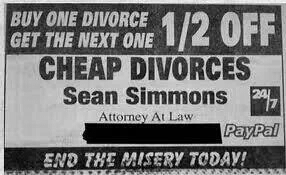“Judge overturns arson/murder conviction of man jailed 24 years” [Scranton Times-Tribune, Monroe County, Pa.; earlier on faulty arson forensics (Willingham execution and Texas Monthly article)]
Archive for September, 2014
Next divorce half off
 Yes, this is a real, if tongue-in-cheek, ad by a Georgia lawyer. Via Huffington Post a year ago, though it dates back at least a year longer than that.
Yes, this is a real, if tongue-in-cheek, ad by a Georgia lawyer. Via Huffington Post a year ago, though it dates back at least a year longer than that.
Judge to Food and Water Watch: put that in your whistle
We’ve occasionally taken note that relators stepping forward under whistleblower laws are not always the public benefactors implied by the term whistleblower. Now here’s this from a suit that a former contractor filed, teaming up with well-connected environmental group Food and Water Watch [Bloomberg]:
“BP never misrepresented — much less knowingly distorted what it was doing,” U.S. District Judge Lynn N. Hughes in Houston said today in a 10-page summary ruling, finding that the case was ultimately about “paperwork wrinkles” instead of engineering shortcuts.
Abbott and the environmentalists “have not blown a whistle,” he said. “They have blown their own horn.”
September 2 roundup
- Police have traced the crime wave to a single micro-neighborhood in the California capital [Sacramento Bee]
- “Adam Carolla Settles with the Patent Trolls” [Daniel Nazer/EFF, Reason, related eight days earlier and previously] eBay takes on Landmark in the E.D. of Texas [Popehat]
- Frank Furedi on law and the decline in childrens’ freedom to roam [U.K. Independent]
- On “ban the box” laws re: asking about job applicants’ criminal records, it’s sued if you do, sued if you don’t [Coyote]
- Fake law firm websites in U.K. sometimes parasitize the real ones [Martha Neil, ABA Journal]
- What C. Steven Bradford of the blog Business Law Prof reads to keep up (and thanks for including us on list);
- As applications to renounce U.S. citizenship mount, many related to FATCA, our government hikes fee for doing so by 422% [Robert Wood, Forbes]
“The increasing criminalization of corporate behavior in America…”
“…is bad for the rule of law and for capitalism,” opines The Economist, saying regulation-through prosecution has become “an extortion racket,” from hundreds of millions in Google drug-ad settlement money spread among Rhode Island police departments, to New York Gov. Andrew Cuomo’s muscling in to extract money from BNP Paribas in a settlement of legal offenses against U.S. foreign policy as distinct from New York consumers:
Who runs the world’s most lucrative shakedown operation? The Sicilian mafia? The People’s Liberation Army in China? The kleptocracy in the Kremlin? If you are a big business, all these are less grasping than America’s regulatory system. The formula is simple: find a large company that may (or may not) have done something wrong; threaten its managers with commercial ruin, preferably with criminal charges; force them to use their shareholders’ money to pay an enormous fine to drop the charges in a secret settlement (so nobody can check the details). Then repeat with another large company. …
Perhaps the most destructive part of it all is the secrecy and opacity. The public never finds out the full facts of the case, nor discovers which specific people—with souls and bodies—were to blame. Since the cases never go to court, precedent is not established, so it is unclear what exactly is illegal. That enables future shakedowns, but hurts the rule of law and imposes enormous costs.
